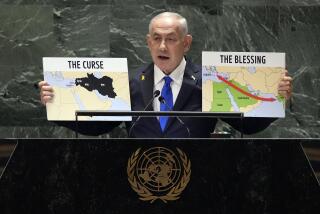Bush Calls Terror War Century’s ‘Decisive Struggle’
- Share via
SALT LAKE CITY — President Bush began a new effort Thursday to shore up flagging support for the war in Iraq, telling a veterans group that the fight against terrorism was no mere military conflict but “the decisive ideological struggle of the 21st century.”
The president responded to those -- including some Republican allies in Congress -- who have asked whether the sectarian violence in Iraq had grown into a civil war, casting doubts on the U.S. role there.
“Our commanders and our diplomats on the ground in Iraq believe that it’s not the case,” Bush said. “They report that only a small number of Iraqis are engaged in sectarian violence, while the overwhelming majority want peace and a normal life in a unified country.”
Addressing the national convention of the American Legion in Utah’s capital, the president cast the fight as a successor to the grand campaigns of the 20th century -- against fascism, Nazism and communism.
Repeating a past theme, Bush said that if the United States left Iraq before insurgents were defeated and the country was secure in its new democracy, the battle against terrorism would eventually be fought on American streets.
The speech was the first in a series the president is to deliver in coming weeks, leading up to a Sept. 19 address to the annual meeting of the U.N. General Assembly in New York.
Polls show that U.S. support for the war continues to founder, potentially undermining what was a key element of the Republican Party’s strength in the 2002 and 2004 elections.
A recent Associated Press-Ipsos poll showed Bush struggling to persuade Americans that Republicans could do a better job than Democrats of protecting them against terrorism. The survey was completed just after the disclosure of an alleged plot to bomb airliners flying to the U.S. from Britain. By a margin of 47% to 40%, respondents said Democrats would perform better -- a sizable margin but down from the 50%-39% margin in favor of the Democrats roughly a week earlier.
A New York Times/CBS News poll made public last week found that Americans, more than before, do not see the war in Iraq and the war against terrorism as one battle, despite Bush’s efforts to link the two. It found that 51% of those questioned saw no link between the two -- 10 percentage points more than in June.
Democrats on Thursday answered Bush’s speech by saying that his policy in Iraq had failed.
“At a time that calls for serious leadership, the president is offering yet another public-relations campaign,” Sen. Edward M. Kennedy (D-Mass.) said in a statement. “His dire warnings of the cost of failure in Iraq do nothing to make success more likely, and his stubborn insistence on staying with a failed policy all but ensures continued violence and chaos.”
“Iraq is in crisis, our military is stretched thin, and terrorist groups and extremist regimes have been strengthened and emboldened across the Middle East and the world,” said Senate Democratic Leader Harry Reid of Nevada.
Bush’s remarks suggested he felt a need to remind Americans that the nation remains a target, even though Saddam Hussein is in custody and Abu Musab Zarqawi, the leader of the Iraq insurgency, is dead.
Bush linked the fighters in Iraq to the terrorists who struck on Sept. 11, those arrested in the British plot, and Hezbollah forces that attacked Israel, and said each would “impose a dark vision of tyranny and terror across the world.”
They are, he said, “successors to fascists, to Nazis, to communists and other totalitarians of the 20th century.”
If the United States left Iraq before the government there could defend itself, he told the veterans in a 44-minute address interrupted repeatedly by applause, the consequences would be “absolutely disastrous.”
“We would be handing Iraq over to our worst enemies --Saddam’s former henchmen, armed groups with ties to Iran and Al Qaeda terrorists from all over the world, who would suddenly have a base of operations far more valuable than Afghanistan under the Taliban.”
Bush said the nation’s enemies come from different parts of the world, draw varied inspiration, and are Sunni, Shiites and “homegrown terrorists.” However, he added, “despite their differences, these groups form the outlines of a single movement, a worldwide network of radicals that use terror to kill those who stand in the way of their totalitarian ideology.”
The question of whether the fighting in Iraq is a civil war has grown in prominence.
At the start of August, two top U.S. commanders -- Army Gen. John P. Abizaid, the senior U.S. commander in the Middle East, and Marine Gen. Peter Pace, chairman of the Joint Chiefs of Staff -- delivered their bleakest assessment yet of sectarian violence in Iraq, saying the need to stem violence between Sunni and Shiite Muslims would preclude a significant reduction of U.S. troops this year.
Abizaid said that the sectarian violence was as bad as he had seen it, and that “if not stopped, it is possible that Iraq would move toward civil war.”
Though some Iraqis and others consider the violence tantamount to undeclared civil war, U.S. officials have avoided characterizing it as such.
*
More to Read
Sign up for Essential California
The most important California stories and recommendations in your inbox every morning.
You may occasionally receive promotional content from the Los Angeles Times.













